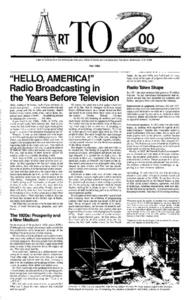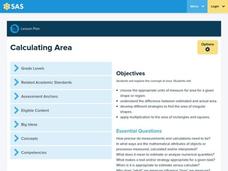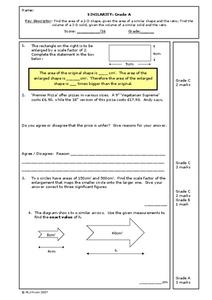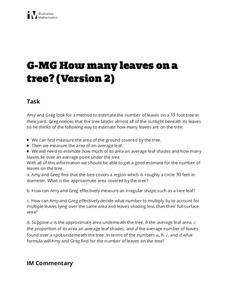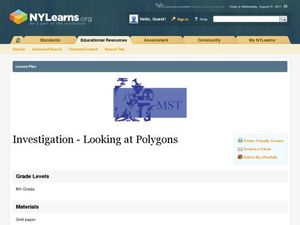Curated OER
How Do Things Fall?
Students observe falling objects. They discover the rate of falling is based on air resistance and not the weight of the objects. They discuss how engineers use this type of information to design aerodynamic shapes.
Curated OER
How Does Radon Get Into Your Home?
Students complete an experiment in which they measure the radon level in their home. They examine the different types of units of measurement and practice using them throughout the activity. They calculate surface area on objects as well.
Curated OER
Cells, The Structural and Functional Units of Life
Students observe the general structure and organelles of plant and animal cells. Students prepare microscope slides of elodea, onion, check, and cork and identify the cells by size and shape as unicellular, multicellular, plant or animal.
Curated OER
Prime and Composite Numbers
Sixth graders inspect prime and composite numbers. Using graph paper, they draw as many different shaped rectangles as possible. They use the dimensions of the rectangles to discuss prime and composite numbers. Students create a chart...
Curated OER
How Does Radon Get Into Your Home?
Students examine their home and calculates the amount of ventilation found. They also compute the surface area of different objects. They determine what is needed to reduce the amount of radon entering the home.
Curated OER
Adjectives
In this ESL adjectives worksheet, students analyze 7 pictures that depict objects of different sizes and shapes. Students match these pictures with the adjectives that describe them.
Curated OER
Teaching in the Shared Way of Ghandi and Montessori
For this differentiated lesson, students incorporate different subjects using the Ghandi and Montessori methods instead of the traditional method used in regular schools. In math they investigate shapes, colors and sizes. In writing they...
Curated OER
Fossil Guide
Students produce a "Fossil Guide" that covers twelve fossils and includes a drawing and written description for each fossil. The written description should include such things as size, shape, and general appearance.
Curated OER
Distortion Unleashed
Students view examples of man-made structures and create a building that matches the style. Using the internet, they research the style of Frank Lloyd Wright and create plans for creating their own community. They use a painting of...
Curated OER
Radio Broadcasting Before Television
Students compare the radio to other forms of mass communication. In this Radio Broadcasting Before Television instructional activity, students learn the different types of radio shows in the 1920s and 30s. Students write and perform...
Curated OER
Wetland in a Pan
Seventh graders build a watershed from various materials. In this life science lesson plan, the students will be able to change the design of their watershed to see the changes in the way the water will drain. Each group will be able to...
Pennsylvania Department of Education
Multiplication Using Arrays
Explore the concept of multiplication by using arrays. Classmates use arrays to gain a better understanding of multiplication. They break arrays apart to model the distributive property of multiplication over addition. The relationship...
Curated OER
Making an Angle Eater
Third graders create angle eaters where they use circles with cut outs to identify right, obtuse, and acute angles. Students complete 1 angle eater.
Curated OER
Digital Story with Math Vocab Words
Create digital stories with your class, in order to help further understand math vocabulary. You can modify this activity idea to any vocabulary lesson, whether it be for math, science, or language arts!
Curated OER
Faberge Easter Egg
Students examine the Russian culture under the Czars and how there was a demand for intricate and beautiful objects. They attempt to create a "jewel-like" object out of an egg using a Spring template supplied by the teacher.
Curated OER
Similarity
In this similarity worksheet, 9th graders solve and complete 6 different types of problems. First, they complete the statement in the box shown. Then, students determine whether they agree or disagree with the statement and given...
Curated OER
Fourth Grade Mathematics Test
In this math activity, 4th graders complete multiple choice questions about multiplication, fractions, rounding, and more. Students complete 29 questions.
Calvin Crest Outdoor School
Survival
Equip young campers with important survival knowledge with a set of engaging lessons. Teammates work together to complete three outdoor activities, which include building a shelter, starting a campfire, and finding directions in the...
Creative Educator
Dream Room Design
Junior designers brainstorm the elements that a bedroom might have, such as a bed, television, and dresser. They identify which items are needs and which are desires. They practice measurement skills in the classroom by determining its...
Owl Teacher
Introduction to World of Geography Test
Assess your learners on the five themes of geography and the most important key terms and concepts from an introductory geography unit. Here you'll find an assessment with 15 fill-in-the-blank and 14 multiple-choice questions, sections...
Illustrative Mathematics
How Many Leaves on a Tree? (Version 2)
A second attack at figuring out the number of leaves on a tree, this activity makes both an excellent follow-up to version 1 and a stand-alone activity. Learners practice setting parameters and deciding acceptable estimate precision, and...
DiscoverE
Spaceship to Mars
Feel like a rocket scientist for the day. Using only paper and tape, scholars create a framework for a spaceship to Mars. Each sheet of paper costs $10 million and each piece of tape costs $100,000. Make sure you stay within budget!
Willow Tree
Perimeter of Common Geometric Figures
Help learners understand that perimeter and circumference are one in the same. Learners apply their skills to determine the perimeter/circumference of triangles, rectangles, and circles. They then use the same strategy to find the...
NY Learns
Investigation - Looking at Polygons
Middle schoolers construct polygons by plotting points on a coordinate plane. Pupils connect the points and identify which polygons they have drawn. They will need graph paper to carry out the assigned activities. A vocabulary list,...









